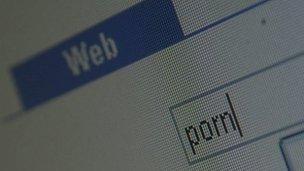Progress made on internet filters, says government
- Published

David Cameron has urged the internet industry to do more to protect children
Internet service providers have made progress in their bid to protect children from pornography, according to the government.
Sky has joined TalkTalk by launching family-friendly filters which customers are asked at the point of signing up if they want to use them.
BT and Virgin are set to introduce something similar within the next two months.
The filters block pornographic websites and can be switched off.
The government wants internet service providers (ISPs) to filter legal pornography and other adult subjects "by default".
Earlier this week, Sky launched Sky Broadband Shield which requires new customers to choose which filters they want, as part of the sign-up process. The 13 rating is pre-selected so customers who do not want this filter applied, need to deselect it.
Existing customers can change their preferences if they access their account on Sky's website.
'Blacklisted'
TalkTalk said its Home Safe product offers numerous filters which do not just block pornography, but also other types of content parents may not want their children to see such as self harm and violence. Customers can choose which filter they want activated.
It said since it launched last year, about a third had signed up which correlates with the number of customers that have children in the home.
The government said by the end of next year, 20 million homes - 95% of all homes in Britain with an existing internet connection - will be required to choose whether to switch on a whole home family friendly internet filter.
Other measures to be introduced include:
ISPs to launch a £25m internet safety campaign over three years to inform parents how to protect their children online.
The Brownies to have a computer skills and safety badge while the Girl Guides will work with TalkTalk to teach girls about how to stay safe online
ISPs to work to prevent the over-blocking of charities, such as those that offer advice to victims of sexual abuse
Prime Minister David Cameron said: "As a dad, it is very simple: I want to know my children are protected when they go onto the internet.
"A family-friendly filter gives me the tool to do that and so this is a really important step forward by the Internet Service Providers.
"As I said in July, we all need to work together, both to prevent children from accessing pornography and educate them about keeping safe online, and I will continue to ensure this happens."
On Monday, the prime minister will hold an internet safety meeting with firms including Google and Microsoft who have been under pressure to do more to block child abuse images on the internet.
Mr Cameron has previously said access to online pornography was "corroding childhood" and has called for "horrific" internet search terms to be blacklisted, meaning they would bring up no results on search websites.
Last year, a public consultation found that 35% of parents wanted an automatic bar on pornography however ministers rejected the plans, saying the move was not widely supported.
- Published22 July 2013
- Published22 July 2013
- Published21 July 2013
- Published18 June 2013
- Published17 June 2013
- Published15 July 2013
- Published31 May 2013